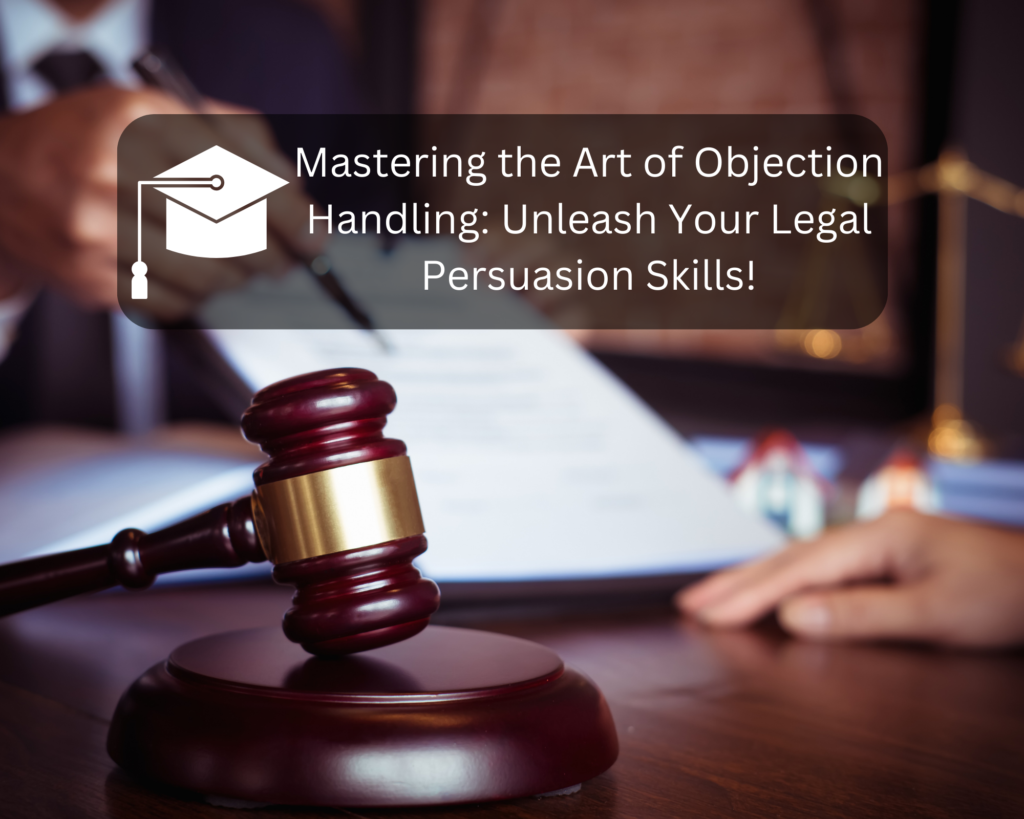Introduction
Handling objections and crafting compelling rebuttals are essential skills for legal professionals. In legal proceedings, objections and counterarguments can arise unexpectedly, challenging the strength of your case. This guide outlines strategies to effectively handle objections and deliver persuasive rebuttals while maintaining your legal position. These skills are crucial for legal professionals to protect their client’s interests, maintain persuasive arguments, and navigate legal proceedings effectively.
Understanding the Importance of Effective Rebuttals
- Preserving Your Argument: Effective rebuttals safeguard the integrity of your legal position against challenges.
- Courtroom Credibility: Skillful handling of objections enhances your credibility as a knowledgeable advocate.
Preparing for Objections and Rebuttals
- Anticipate Challenges: Identify potential objections that opposing counsel may raise.
- Rehearse Responses: Practice formulating succinct and convincing rebuttals in advance.

Active Listening and Quick Thinking
- Attentive Listening: Pay close attention to the objection, ensuring you fully understand the opposing argument.
- Quick Assessment: Assess the objection’s validity and determine the best course of action swiftly.
Responding with Precision
- Focused Responses: Address the objection directly without veering off-topic.
- Clear and Concise Language: Use clear language to convey your point effectively.
Leveraging Case Law and Precedents
- Legal Authority: Cite relevant case law or precedents that support your position.
- Analogous Situations: Highlight analogous cases where similar objections were resolved in your favor.
Addressing the Underlying Concerns
- Understand the Motivation: Understand the motive behind the objection and address it comprehensively.
- Persuasive Explanation: Present your explanation with persuasive reasoning and supporting evidence.
Maintaining Professionalism
- Respectful Response: Respond to objections in a respectful and composed manner.
- Avoid Personal Attacks: Focus on the legal issues rather than attacking opposing counsel personally.
Constructive Engagement with Opposing Counsel
- Avoidance of Disruption: Engage with opposing counsel constructively to ensure the proceedings remain focused.
- Clarify Ambiguities: Seek clarification if the objection is unclear to prevent misunderstandings.
Managing Emotional Responses
- Stay Calm: Keep emotions in check, responding logically rather than emotionally.
- Turning Challenges into Opportunities: View objections as chances to strengthen your argument through well-crafted responses.
Adapting to the Judge’s Perspective
- Judge-Centric Approach: Frame your rebuttal with consideration for the judge’s perspective.
- Alignment with Legal Standards: Align your response with legal standards that the judge upholds.
Turning Rebuttals into Opportunities
- Counterargument Strength: Use your rebuttal to introduce additional strong points supporting your position.
- Showcasing Knowledge: Demonstrate your comprehensive understanding of the case through effective rebuttals.
Conclusion
Effectively handling objections and delivering compelling rebuttals requires careful preparation, active listening, and skillful reasoning. By applying the strategies discussed in this guide, legal professionals can navigate objections with confidence, maintain persuasive arguments, and contribute to the success of their cases.
FAQs
- How do objections impact legal proceedings? Objections challenge the admissibility of evidence, legal arguments, or witness testimony, affecting the course of legal proceedings.
- Is it necessary to respond immediately to objections? Responding promptly to objections demonstrates your readiness and maintains the flow of the proceedings.
- How can I manage objections while maintaining professionalism? Respond respectfully, focus on legal issues, and avoid personal attacks to maintain professionalism during objections.
- Can I ask for clarification during objections? Yes, seeking clarification ensures you fully understand the objection before formulating your response.
- How can I turn objections into opportunities? Use objections as a chance to strengthen your position by introducing new supporting points and showcasing your knowledge.
